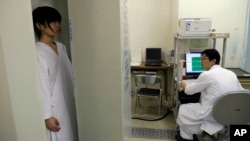The World Health Organization says those exposed to the worst levels of radiation during the Japanese nuclear disaster have a higher risk for developing certain types of cancer.
In a report Thursday, the U.N. agency said the most affected were those near the Fukushima Dai-ichi nuclear power plant. Around 110,000 people in the area were evacuated in March 2011 after a massive earthquake and tsunami caused a meltdown in the plant's nuclear reactors and sent radiation spewing into the surrounding area.
The WHO report says there is little to no risk of increased cancer rates among those outside the Fukushima area.
But the agency estimates there is up to a 70 percent increased risk of thyroid cancer among females exposed as infants in the most contaminated area. The risk of leukemia increased by 7 percent for males exposed as infants.
Around one-third of emergency workers who responded to the nuclear power plant crisis were also estimated to have an increased cancer risk.
But Richard Wakeford, one of the authors of the report, told the Associated Press that the increased risks of cancers outlined in the report were so small, they will be probably not be observable.
The report recommended that authorities continue to monitor and provide regular health screenings for those who are at the highest risk. Besides the direct health impact, the report says the "psychosocial impact may have a consequence on health and well-being."
In a report Thursday, the U.N. agency said the most affected were those near the Fukushima Dai-ichi nuclear power plant. Around 110,000 people in the area were evacuated in March 2011 after a massive earthquake and tsunami caused a meltdown in the plant's nuclear reactors and sent radiation spewing into the surrounding area.
The WHO report says there is little to no risk of increased cancer rates among those outside the Fukushima area.
But the agency estimates there is up to a 70 percent increased risk of thyroid cancer among females exposed as infants in the most contaminated area. The risk of leukemia increased by 7 percent for males exposed as infants.
Around one-third of emergency workers who responded to the nuclear power plant crisis were also estimated to have an increased cancer risk.
But Richard Wakeford, one of the authors of the report, told the Associated Press that the increased risks of cancers outlined in the report were so small, they will be probably not be observable.
The report recommended that authorities continue to monitor and provide regular health screenings for those who are at the highest risk. Besides the direct health impact, the report says the "psychosocial impact may have a consequence on health and well-being."







